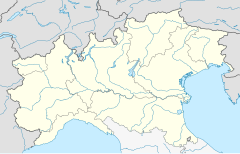
Milan has an extensive internal transport network and is also an important transportation node in Italy, being one of the country's biggest hubs for air, rail and road networks. Internal public transport network includes the Metro, the Suburban Railway, the tram and bus network, as well as taxi, car and bike sharing services.
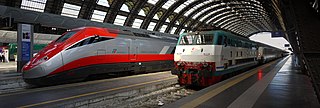
The Italian railway system is one of the most important parts of the infrastructure of Italy, with a total length of 24,567 km (15,265 mi) of which active lines are 16,832 km (10,459 mi). The network has recently grown with the construction of the new high-speed rail network. Italy is a member of the International Union of Railways (UIC). The UIC Country Code for Italy is 83.

The Rome Metro is a rapid transit system that operates in Rome, Italy. It started operation in 1955, making it the oldest in the country.

The Milan Metro is the rapid transit system serving Milan, Italy, operated by Azienda Trasporti Milanesi. The network consists of 5 lines with a total network length of 104.1 kilometres (64.7 mi), and a total of 113 stations, mostly underground. It has a daily ridership of about 1.4 million on weekdays. The Milan Metro is the largest system in Italy in terms of length, number of stations and ridership; and the seventh longest in the European Union.

Line 1 is the first underground rapid transit line built in Milan, Italy. It is part of the Milan Metro and it is operated by ATM. Works on the line began in 1957, and the first part was opened on 1 November 1964, running from Sesto Marelli to Lotto station. The line is also called Red Line, as it is visually identified by red signs. Due to its premiership, the line gave its red color to the Milan Metro logo.

Line 3 is a subway line serving Milan, Italy. The line is part of the Milan Metro and is operated by ATM. Construction began in 1981 in order to be ready for the 1990 Football World Cup. It is also called the Yellow Line as it is identified by yellow signage.

The Turin Metro is the modern VAL rapid transit system serving Turin. It is operated by Gruppo Torinese Trasporti (GTT), a public company controlled by the municipality of Turin. The system comprises one 15.1-kilometre line with 23 stations connecting Fermi station in Collegno with Piazza Bengasi in Turin, near the border with the municipality of Moncalieri.

Line C is a Rome Metro line which runs from Monte Compatri-Pantano in the eastern suburbs of Rome, in Italy, to San Giovanni near the city centre, where it meets Line A. It is the third metro line to be built in the city and the first to be fully automated.

Torino Porta Nuova railway station is the main railway station of Turin, northern Italy. It is the third busiest station in Italy after Rome Termini and Milan Central, with about 192,000 journeys per day and 70 million travellers a year and a total of about 350 trains per day. Porta Nuova is a terminal station, with trains arriving perpendicularly to the facade. The station is located in Corso Vittorio Emanuele II, right in front of Piazza Carlo Felice.

The Passante Ferroviario di Milano is an underground railway which runs through Milan, Italy.

Line 5 is an underground rapid transit line in Milan, Italy, part of the Milan Metro. The line, also known as M5 or the Lilac Line, is 12.8-kilometre (8.0 mi) long and goes through the city from the north to the north-west. It opened in stages between 2013 and 2015.
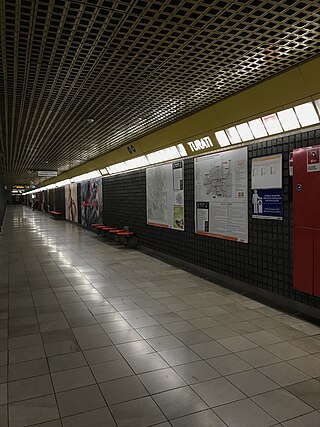
Turati is a station on Line 3 of the Milan Metro which opened on 1 May 1990, as part of the inaugural section of the line between Duomo and Centrale. Initially, Duomo was connected with Centrale by shuttle service, and on 16 December 1990, with the extension of the line to Porta Romana, full-scale service started.
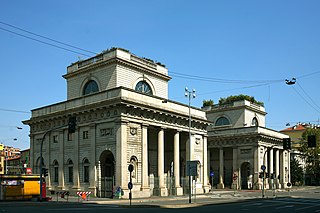
Porta Venezia is one of the historical gates of the city of Milan, Italy. In its present form, the gate dates back to the 19th century; nevertheless, its origins can be traced back to the medieval and even the Roman walls of the city.
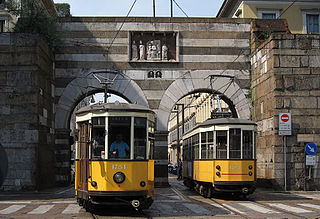
The Milan tramway network is part of the public transport network of Milan, Italy, operated by Azienda Trasporti Milanesi (ATM).

Line 4 is an underground rapid transit line in Milan, Italy, part of the Milan Metro. The line color is blue. The first section opened on 26 November 2022 and as of 2023 it is 7.3 km long with 8 stations. The full line is expected to open by 2024. Once completed, the line will be 15 km (9.3 mi) long with 21 stations.
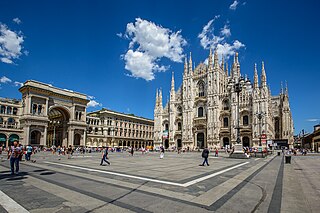
The Zone 1 of Milan, since 2016 officially Municipality 1 of Milan, is one of the 9 administrative divisions of Milan, Italy.

Franca Helg was an Italian designer and architect. She also had a career teaching at Istituto Universitario Architettura Venezia and Polytechnic of Milan. She collaborated with Franco Albini from 1945 through 1977.

The following outline is provided as an overview of and topical guide to Milan:

Palazzo Arese was a 16th century baroque palace and seat of a branch of the House of Arese in Milan, Italy. It was located adjacent to Casa Fontana Silvestri near the Porta Orientale. The palazzo was demolished in 1943 following damage sustained during the bombing of Milan in World War II.



